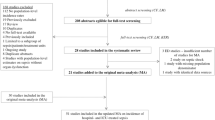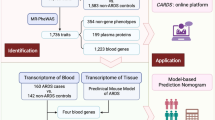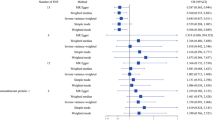Abstract
The aim of this study was to explore the association between some SNPs of the TNF, LTA, IL1B and IL10 genes with cytokine concentrations and clinical course in Colombian septic patients. We conducted a cross-sectional study to genotype 415 septic patients and 205 patients without sepsis for the SNPs −308(G/A) rs1800629 of TNF; +252 (G/A) rs909253 of LTA; −511(A/G) rs16944 and +3953(C/T) rs1143634 of IL1B; and −1082(A/G) rs1800896, −819(C/T) rs1800871 and −592(C/A) rs1800872 of IL10. The association of theses SNPs with the following parameters was evaluated: (1) the presence of sepsis; (2) severity and clinical outcomes; (3) APACHE II and SOFA scores; and (4) procalcitonin, C-reactive protein, tumor necrosis factor, lymphotoxin alpha, interleukin 1 beta and interleukin 10 plasma concentrations. We found an association between the SNP LTA +252 with the development of sepsis [OR 1.29 (1.00–1.68)]; the SNP IL10 −1082 with sepsis severity [OR 0.53 (0.29–0.97)]; the TNF −308 with mortality [OR 0.33 (0.12–0.95)]; and the IL10 −592 and IL10 −1082 with admission to the intensive care unit (ICU) [OR 3.36 (1.57–7.18)] and [OR 0.18 (0.04–0.86)], respectively. None of the SNPs were associated with cytokine levels, procalcitonin and C-reactive protein serum concentrations, nor with APACHE II and SOFA scores. Our results suggest that these genetic variants play an important role in the development of sepsis and its clinical course.


Similar content being viewed by others
References
Mayr FB, Yende S, Angus DC. Epidemiology of severe sepsis. Virulence. 2014;5:4–11. doi:10.4161/viru.27372.
Rodríguez F, Barrera L, De La Rosa G, et al. The epidemiology of sepsis in Colombia: a prospective multicenter cohort study in ten university hospitals. Crit Care Med. 2011;39:1675–82. doi:10.1097/CCM.0b013e318218a35e.
Levy MM, Fink MP, Marshall JC, et al. 2001 SCCM/ESICM/ACCP/ATS/SIS International Sepsis Definitions Conference. Intensive Care Med. 2003;29:530–8. doi:10.1007/s00134-003-1662-x.
Seymour CW, Liu VX, Iwashyna TJ, et al. Assessment of clinical criteria for sepsis: for the third international consensus definitions for sepsis and septic shock (sepsis-3). JAMA. 2016;315:762–74. doi:10.1001/jama.2016.0288.
Wiersinga WJ, Leopold SJ, Cranendonk DR, van der Poll T. Host innate immune responses to sepsis. Virulence. 2014;5:36–44. doi:10.4161/viru.25436.
Iskander KN, Osuchowski MF, Stearns-Kurosawa DJ, et al. Sepsis: multiple abnormalities, heterogeneous responses, and evolving understanding. Physiol Rev. 2013;93:1247–88. doi:10.1152/physrev.00037.2012.
Cui L, Gao Y, Xie Y, et al. An ADAM10 promoter polymorphism is a functional variant in severe sepsis patients and confers susceptibility to the development of sepsis. Crit Care. 2015;19:796. doi:10.1186/s13054-015-0796-x.
Wang TS, Deng JC. Molecular and cellular aspects of sepsis-induced immunosuppression. J Mol Med (Berl). 2008;86:495–506. doi:10.1007/s00109-007-0300-4.
Papathanassoglou EDE, Giannakopoulou MD, Bozas E. Genomic variations and susceptibility to sepsis. AACN Adv Crit Care. 2009;17:394–422.
Bone RC. Toward a theory regarding the pathogenesis of the systemic inflammatory response syndrome: what we do and do not know about cytokine regulation. Crit Care Med. 1996;24:163–72.
Sugitharini V, Prema A, Berla Thangam E. Inflammatory mediators of systemic inflammation in neonatal sepsis. Inflamm Res. 2013;62:1025–34. doi:10.1007/s00011-013-0661-9.
Damas P, Canivet JL, de Groote D, et al. Sepsis and serum cytokine concentrations. Crit Care Med. 1997;25:405–12.
Kumar AT, Sudhir U, Punith K, et al. Cytokine profile in elderly patients with sepsis. Indian J Crit Care Med. 2009;13:74–8. doi:10.4103/0972-5229.56052.
Oberholzer A, Souza SM, Tschoeke SK, et al. Plasma cytokine measurements augment prognostic scores as indicators of outcome in patients with severe sepsis. Shock. 2005;23:488–93.
De La Rosa GD, Valencia ML, Arango CM, et al. Toward an operative diagnosis in sepsis: a latent class approach. BMC Infect Dis. 2008;8:18. doi:10.1186/1471-2334-8-18.
Purcell S, Neale B, Todd-Brown K, et al. PLINK: a tool set for whole-genome association and population-based linkage analyses. Am J Hum Genet. 2007;81:559–75. doi:10.1086/519795.
Wigginton JE, Cutler DJ, Abecasis GR. A note on exact tests of Hardy-Weinberg equilibrium. Am J Hum Genet. 2005;76:887–93. doi:10.1086/429864.
Barrett JC, Fry B, Maller J, Daly MJ. Haploview: analysis and visualization of LD and haplotype maps. Bioinformatics. 2005;21:263–5. doi:10.1093/bioinformatics/bth457.
Davis SM, Clark EAS, Nelson LT, Silver RM. The association of innate immune response gene polymorphisms and puerperal group A streptococcal sepsis. Am J Obstet Gynecol. 2010;202:308-e1–8. doi:10.1016/j.ajog.2010.01.006.
Kietthubthew S, Wickliffe J, Sriplung H, et al. Association of polymorphisms in proinflammatory cytokine genes with the development of oral cancer in Southern Thailand. Int J Hyg Environ Health. 2010;213:146–52. doi:10.1016/j.ijheh.2010.01.002.
Paskulin DD, Fallavena PR, Paludo FJ, et al. TNF −308G > a promoter polymorphism (rs1800629) and outcome from critical illness. Braz J Infect Dis. 2011;15:231–8.
Schaaf BM, Boehmke F, Esnaashari H, et al. Pneumococcal septic shock is associated with the interleukin-10-1082 gene promoter polymorphism. Am J Respir Crit Care Med. 2003;168:476–80. doi:10.1164/rccm.200210-1164OC.
Surbatovic M, Grujic K, Cikota B, et al. Polymorphisms of genes encoding tumor necrosis factor-α, interleukin-10, cluster of differentiation-14 and interleukin-1ra in critically ill patients. J Crit Care. 2010;25(542):e1–8. doi:10.1016/j.jcrc.2009.12.003.
Teuffel O, Ethier M-C, Beyene J, Sung L. Association between tumor necrosis factor-α promoter −308 A/G polymorphism and susceptibility to sepsis and sepsis mortality: a systematic review and meta-analysis. Crit Care Med. 2010;38:276–82. doi:10.1097/CCM.0b013e3181b42af0.
Zeng L, Gu W, Chen K, et al. Clinical relevance of the interleukin 10 promoter polymorphisms in Chinese Han patients with major trauma: genetic association studies. Crit Care. 2009;13:R188. doi:10.1186/cc8182.
Zidan HE, Elbehedy RM, Azab SF. IL6-174 G/C gene polymorphism and its relation to serum IL6 in Egyptian children with community-acquired pneumonia. Cytokine. 2014;67:60–4. doi:10.1016/j.cyto.2014.02.013.
Shao Y, Li J, Cai Y, et al. The functional polymorphisms of miR-146a are associated with susceptibility to severe sepsis in the Chinese population. Mediat Inflamm. 2014;. doi:10.1155/2014/916202.
Ramakrishna K, Pugazhendhi S, Kabeerdoss J, Peter JV. Association between heat shock protein 70 gene polymorphisms and clinical outcomes in intensive care unit patients with sepsis. Indian J Crit Care Med. 2014;18:205–11. doi:10.4103/0972-5229.130571.
Wang D, Zhong X, Huang D, et al. Functional polymorphisms of interferon-γ affect pneumonia-induced sepsis. PLoS One. 2014;9:e87049. doi:10.1371/journal.pone.0087049.
Gracia F, Armien B, Simpson SQ, et al. Convalescent pulmonary dysfunction following hantavirus pulmonary syndrome in Panama and the United States. Lung. 2010;188:387–91. doi:10.1007/s00408-010-9245-4.
Cardona-Castro N, Sánchez-Jiménez M, Rojas W, Bedoya-Berrío G. IL-10 gene promoter polymorphisms and leprosy in a Colombian population sample. Biomédica. 2012;32:71–6. doi:10.1590/S0120-41572012000100009.
Guarnizo-Zuccardi P, Lopez Y, Giraldo M, et al. Cytokine gene polymorphisms in Colombian patients with systemic lupus erythematosus. Tissue Antigens. 2007;70:376–82. doi:10.1111/j.1399-0039.2007.00917.x.
Romero-Sánchez C, Londoño J, Delgado G, et al. Association of tumor necrosis factor α-308 promoter polymorphism with spondyloarthritides patients in Colombia. Rheumatol Int. 2012;32:2195–7. doi:10.1007/s00296-011-1883-1.
Camargo JF, Correa PA, Castiblanco J, Anaya J-M. Interleukin-1β polymorphisms in Colombian patients with autoimmune rheumatic diseases. Genes Immun. 2004;5:609–14. doi:10.1038/sj.gene.6364133.
Watanabe E, Buchman TG, Hirasawa H, Zehnbauer BA. Association between lymphotoxin-α (tumor necrosis factor-β) intron polymorphism and predisposition to severe sepsis is modified by gender and age. Crit Care Med. 2010;38:181–93. doi:10.1097/CCM.0b013e3181bc805d.
Tiancha H, Huiqin W, Jiyong J, et al. Association between lymphotoxin-α intron +252 polymorphism and sepsis: a meta-analysis. Scand J Infect Dis. 2011;43:436–47. doi:10.3109/00365548.2011.562528.
Shu Q, Fang X, Chen Q, Stuber F. IL-10 polymorphism is associated with increased incidence of severe sepsis. Chin Med J (Engl). 2003;116:1756–9.
Stanilova SA, Miteva LD, Karakolev ZT, Stefanov CS. Interleukin-10-1082 promoter polymorphism in association with cytokine production and sepsis susceptibility. Intensive Care Med. 2006;32:260–6. doi:10.1007/s00134-005-0022-4.
Gomez HG, Gonzalez SM, Londoño JM, et al. Immunological characterization of compensatory anti-inflammatory response syndrome in patients with severe sepsis: a longitudinal study*. Crit Care Med. 2014;42:771–80. doi:10.1097/CCM.0000000000000100.
de Oliveira Paludo FJ, Picanço JB, de Fallavena PRV, et al. Higher frequency of septic shock in septic patients with the 47C allele (rs4880) of the SOD2 gene. Gene. 2013;517:106–11. doi:10.1016/j.gene.2012.10.078.
Acknowledgments
We thank COLCIENCIAS for its financial support (Grant 111551928730) and the program “Estrategia de Sostenibilidad 2014–2015 de la Universidad de Antioquia.” Mayra Alejandra Diosa helped in DNA isolation, and David Arcila helped in the English correction. The authors wish to thank Anne-Lise Haenni for her constructive comments.
Author information
Authors and Affiliations
Corresponding author
Ethics declarations
Conflict of interest
All authors declare that they do not have a financial relationship with the organization that sponsored the research and have no conflict of interest.
Ethical approval
“All procedures performed in studies involving human participants were in accordance with the ethical standards of the institutional and/or of the National Research Committee and with the 1964 Helsinki declaration and its later amendments or comparable ethical standards.”
Electronic supplementary material
Below is the link to the electronic supplementary material.
Rights and permissions
About this article
Cite this article
Montoya-Ruiz, C., Jaimes, F.A., Rugeles, M.T. et al. Variants in LTA, TNF, IL1B and IL10 genes associated with the clinical course of sepsis. Immunol Res 64, 1168–1178 (2016). https://doi.org/10.1007/s12026-016-8860-4
Published:
Issue Date:
DOI: https://doi.org/10.1007/s12026-016-8860-4




